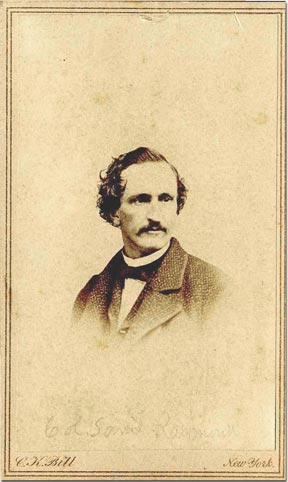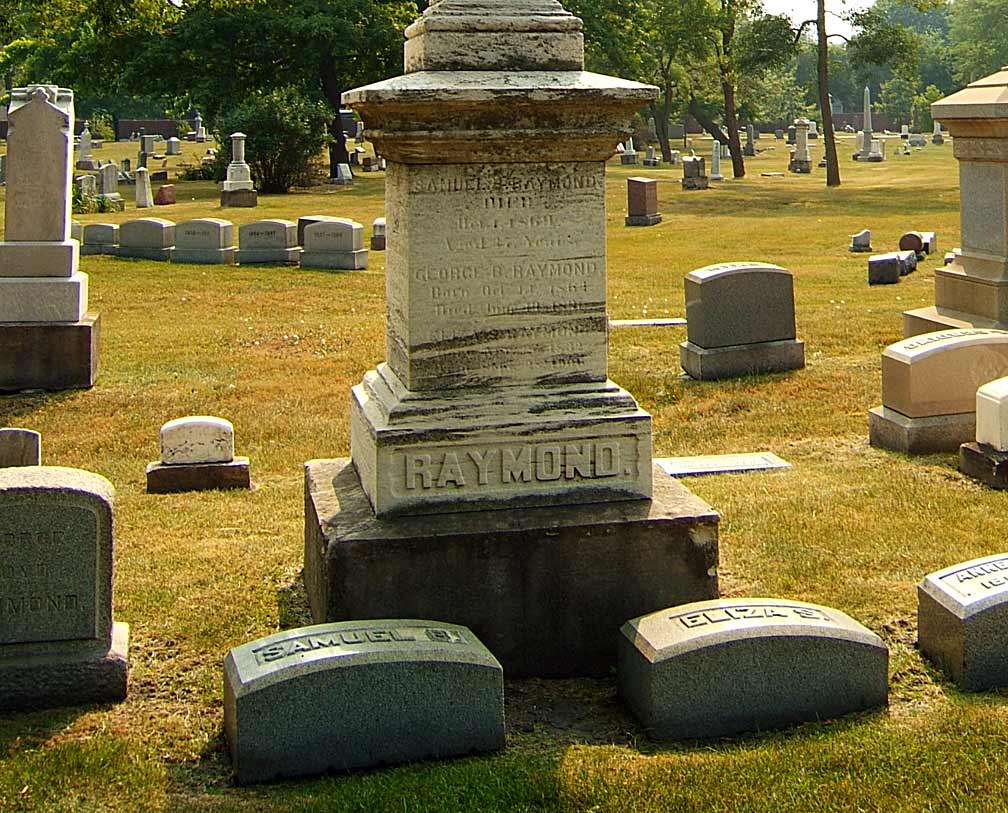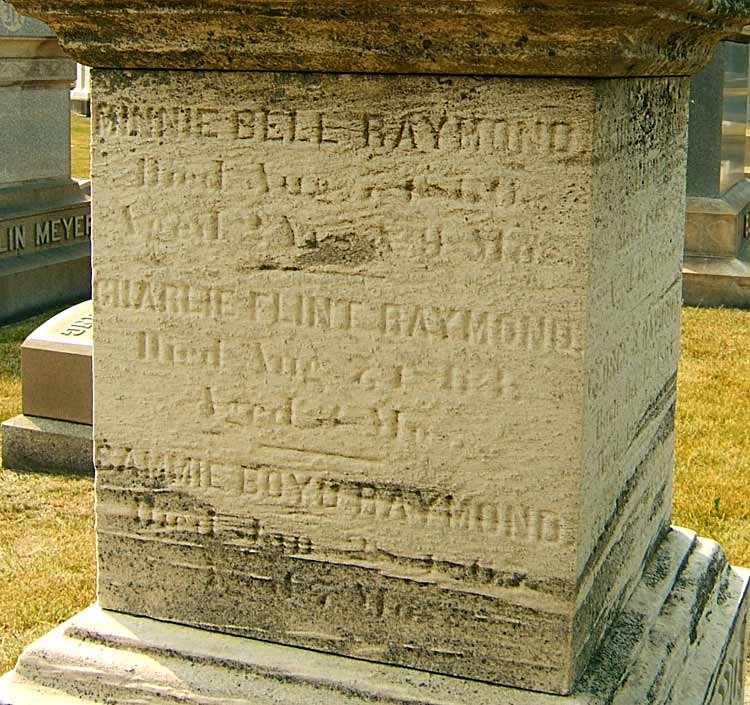 Samuel B. Raymond
Samuel B. RaymondLieutenant Colonel
 Samuel B. Raymond
Samuel B. Raymond
Lieutenant Colonel
Samuel Boyd Raymond was born in Laurens, Otsego County, New York in 1832. His parents were Lewis and Mary Raymond. Lewis Raymond was a Baptist minister; he moved his family west to Milwaukee in 1844, for evangelical work, and in 1849 to Chicago. The 1850 census shows Minister Lewis Raymond living in Chicago's Second Ward. Samuel is listed as the oldest child at age 18; there are seven other children, the youngest being less than a year old.
On December 22, 1853, Samuel married Eliza S. Flint. Like Samuel, she was also born in New York in 1832. They had two daughters, Fannie and Minnie, before the outbreak of the Civil War. A son Charlie Flint Raymond was born soon after the war began.
When the Fifty-First Illinois left Chicago for the war, The Chicago Tribune wrote, "Major Samuel B. Raymond was born in Otsego county and came to this city in 1848. He was for some time a printer in the Western Citizen office and subsequently became engaged in mercantile pursuits, and still later was associated with Hubbard & Hunt in the insurance business. He held the office of captain of the Citizen's Fire Brigade two years, and upon the fall of Sumter organized the 'Anderson Rifles' which he brought to a remarkable degree of efficiency in drill. He was elected Lieut. Col. of the First Regiment Illinois State Militia, from which he was transferred to this present position for active service. Everyone knows 'Sam,' and it is hardly necessary to endorse him as a whole-souled, exemplary man, or to state that he leaves behind him an army of friends" (February 13, 1862).
Raymond was the first major of the Fifty-First Illinois Infantry and was engaged in the regiment building activities through out the autumn of 1861 and the first six weeks of 1862. He performed various command functions during the campaign against New Madrid and Island No. 10 during March and early April, 1862.
In May and June of 1862—the regiment was at Farmington and Corinth, Mississippi—Raymond took sick with the fever, like many many other men of the regiment. He returned to Chicago, spent time in the hospital, and eventually recovered. This same round of fever killed several men of the regiment, led to the disability resignation of Colonel Gilbert Cumming, and hospitalized other members of the regiment, both in Mississippi and by furlough in Illinois. Raymond returned to the regiment, but he was not yet a healthy man.
In July 1862, the regiment left the environs of Corinth, Mississippi, assigned with other regiments to protect the Memphis & Charleston Railroad. On August 2, 1862, Raymond took command of companies E & G for their duties on the Fox Creek (Alabama) guarding railroad bridges while regimental headquarters moved on to Decatur, Alabama. That duty continued into September when the detachments of the regiment reassembled in Decatur. October 14, 1862, Raymond was promoted to Lieutenant Colonel when Luther Bradley was promoted from that grade to colonel of the regiment.
On November 29, 1862, Raymond was detached from the Fifty-First so as to serve as chief of staff to Brigadier General Eleazar Paine who was put in charge of the federal post at Gallatin, Tennessee. On January 28, 1863, Raymond having returned from his detached service with Paine, took command of the regiment as it camped near Murfreesboro in the aftermath of the Battle of Stone's River. Luther Bradley, colonel of the Fifty-First, was in command of the brigade, so command of the regiment fell to Raymond. But already, Raymond's health was again in decline.
On March 2, 1863, Raymond initiated the process to resign from the service for health reasons. Francis Lytle, the first assistant surgeon of the Fifty-First, wrote that Raymond was failing to respond to weeks of treatment to the point that "he is compelled to remain in quarters most of the time." Raymond wrote, "I have been under treatment for it for the last three months, without success—continually growing worse." Lytle added, "Altho' I have given him the usual remedies [for chronic articular rheumatism], he fails to improve. My opinion is that he will not improve without rest, appropriate treatment, and comfortable quarters.... He is in my opinion unfit for duty." The medical director of the Twentieth Army Corps, however, intervened in the resignation process and suggested instead that Raymond again take medical leave and give himself a chance to recover. The medical director wrote, Raymond "is represented as an efficient officer and is not anxious to leave the service if his health will permit of his remaining. I believe, that by proper care, his health may be restored so as to admit of his remaining and that his recovery would be facilitated by change of climate and removal from the exposures of camp life." Raymond's resignation was therefore not accepted or pursued. Instead Raymond, just as the regiment was leaving the Murfreesboro camps to pursue Van Dorn through other parts of Tennessee, returned to Chicago on medical leave. There, he recovered his health to a large extent. He was able to return to the regiment on April 10, 1863.
In August 1863, Raymond received news of the death of his son Charlie. On August 8, he requested leave once more. The request said also, "My wife lies dangerously ill." He went to Chicago and buried his son; by the end of August, Raymond was back with the regiment, as the Army of the Cumberland backed Bragg's army toward Georgia—and Chickamauga. Raymond was in command of the regiment at the Battle of Chickamauga, his first active command in battle.
Raymond submitted his resignation on October 5, 1863, barely two weeks after the Battle of Chickamauga, as the regiment along with the rest of the Army of the Cumberland was entrenching in Chattanooga. Raymond adduced business concerns as the reason: "Owing to the death of my partner and the failure of our assignee and the latter's total neglect of the assets of the firm, I am liable to lose all that I have and myself and family suffer great hardship in consequence." He attached an "Explanation of Reason" to his letter of resignation. It read,
| Just before entering the service myself and partner had for seven years been engaged in mercantile business in Chicago, and during the stringency of those times we were compelled to make an assignment, including everything we possessed. The assets were sufficiently large to settle everything and leave us a handsome sum beside, but after I entered the army the assignee totally neglected our interest. My partner moved to another state and was not able to look after matters in consequence of ill health. Lately my partner has died and the assignee has himself failed in consequence of which all I have in the world is in danger of being sacrificed. I received this information at Bridgeport, Ala. just before the last campaign commenced and prevailed upon the creditors to stay any proceedings until this campaign was ended, and, if I survived it, I would, if possible, get released and give my personal attention to the settling up of their claims. Unless I can attend to this at once, it will bring great hardship upon myself and family. |
Raymond's resignation was accepted October 6, 1863. After his resignation Raymond returned to Chicago and salvaged what could be salvaged from his mercantile interests. He returned to his family and his home. He became the agent of the western branch of the Ohio Life Insurance Company. His sons George B. and Sammie Boyd were born. When the reunion of four great Federal Civil War armies—the Armies of the Cumberland, the Tennessee, the Ohio, and the Army of Georgia—convened in Chicago in December, 1868 Raymond served on the finance committee (along with another member of the Fifty-First, Theodore F. Brown) and looked fair to be one of those members of the regiment who participated actively in veterans' functions and associations.
But Raymond was not long for the world. Illness caught up with him again, and he died on October 1, 1869. His obituary said, "He had been complaining during the summer of some vague sickness, which he could not explain, but continued with his labors until last Friday week, when he was taken very ill and continued so up to the time of his death, which was caused by congestion of the bowels."
Raymond is buried in Chicago's Graceland Cemetery in the same plot as his father Lewis Raymond and numerous other Raymonds, young and old, but mostly young. The picture below shows the smaller gravestones of Samuel and Eliza at the foot of the family obelisk. This face of the obelisk reads, "Samuel B. Raymond, Died October 1, 1869, Aged 37 years." Eliza lived on until 1906, preceded in death by nearly all her Raymonds. The 1870 census listed her as "Keeping House" in Chicago; her real estate was valued at $50,000, so loss but not poverty was her lot. The children Minnie Bell and Charlie Flint and Sammie Boyd were dead (see gravestone picture at bottom of page). Fannie, her oldest, and George B. were still with her. We have a last glimpse of Eliza in 1900 living in the home of Fannie, now Fannie Johnson, in New Trier, Cook County, Illinois.
 |
|
Sources: Photograph of Raymond from the Collection of Nicholas Kaup, Northbrook, Illinois. United States Census, 1850, 1860, 1870, 1880. Graceland Cemetery photography by Cindi Lynn Geeze, Chicago. Samuel Raymond Obituary, Chicago Tribune, October 3, 1869. The Army Reunion with Reports of the Meetings of the Societies of the Army of the Cumberland; The Army of the Tennessee; The Army of the Ohio; and The Army of Georgia, Chicago, December 15 and 16, 1868, Chicago: S. C. Griggs and Company, 1869. |
 |